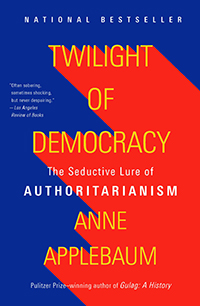 Anne Applebaum, Twilight of Democracy: The Seductive Lure of Authoritarianism (New York: Doubleday, 2020), 206pp.
Anne Applebaum, Twilight of Democracy: The Seductive Lure of Authoritarianism (New York: Doubleday, 2020), 206pp.
One of the things that caught my eye about this book was its two back cover blurbs — one from Timothy Snyder of Yale University (see my review of his book On Tyranny), and the other from the conservative David Frum, a former speech-writer for President George W. Bush. The historian Anne Applebaum is one of the few commentators today who commands that sort of broad-based respect. She's best known for a trilogy of books on the history of the Soviet Union, one of which earned her a Pulitzer Prize (2004). Today she's a staff writer for The Atlantic.
Are we now in the twilight of democracy? In the first three quarters of her book Applebaum seems to argue that case. She begins in Poland, where she has lived much of her life since 1988, with the rise of the nativist Law and Justice Party, then moves to Hungary and Viktor Orbán's unapologetic illiberalism. She considers Brexit and Spain's far-right Vox party, and then the United States, where a "cadre of elites" that includes Steve Bannon (a Harvard MBA) and Laura Ingraham (who clerked for the Supreme Court Justice Clarence Thomas) specialize in scorched earth politics.
Applebaum explores numerous examples of the erosion of the rule of law, checks and balances, representative democracy, religious toleration, an independent judiciary, freedom of the press, and a commitment to international institutions. We now struggle with various nationalisms, autocracy, populism, conspiracy theories, xenophobia, scape-goating, and alternate realities. All of these trends are magnified by the force-multiplier of the internet.
Applebaum reminds us that our founding fathers thought that history was more circular than linear, that political progress is never guaranteed or permanent, that human nature is flawed, and that it takes unending vigilance for democracy to avoid sliding into tyranny. The many complicated questions about national identity are never settled once and for all. In her final pages Applebaum tries to sound a positive note. But she admits that you can argue the case either way. "We may be doomed," she writes, "to be swept away into irrelevance." Or maybe a younger generation can lead us to a renewed sense of global solidarity. "Both futures are possible," whereas "liberal democracies always demand things from their citizens: participation, argument, effort, struggle."
Dan Clendenin: dan@journeywithjesus.net


